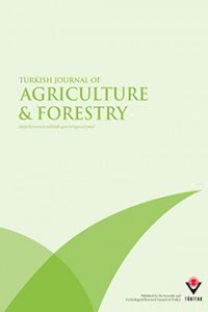Tree-induced changes in a terra rossa soil under olive. Observations from an integrated field study
Micromorphology roots, SEM, stress features, XRD, illite-like minerals,
- ISSN: 1300-011X
- Yayın Aralığı: Yılda 6 Sayı
- Yayıncı: TÜBİTAK
Alina Vilcan (TRUTA), Lucica Mihalte (CRISAN), Adriana F. SESTRAS, Liviu HOLONEC, Radu E. SESTRAS
ÇEKNAS ERDİNÇ, EMRE DEMİRER DURAK, AYTEKİN EKİNCİALP, SUAT ŞENSOY, SEMRA DEMİR
Emre Demirer DURAK, Semra DEMİR, Çeknas ERDİNÇ, Suat ŞENSOY, Aytekin EKİNCİALP
Bud management affects fruit wood, growth, and precocity of cherry trees
İdris MACİT, Gregory A. LANG, Hüsnü DEMİRSOY
İdris MACİT, Gregory A. LANG, Hüsnü DEMİRSOY
Relations between downy/powdery mildew diseases and some phenolic compounds in Vitis spp.
Zekiye GÖKSEL, Arif ATAK, Hüseyin ÇELİK
Salvatore MADRAU, Claudio ZUCCA, İhsan AKŞİT, Zülküf KAYA, Selim KAPUR
Letizia INSERRA, Turgut CABAROĞLU, Kemal ŞEN, Elena ARENA, Gabriele BALLISTRERI, Biagio FALLICO
Genetic variation and potential genetic resources of several Romanian larch populations
Adriana F. SESTRAS, Liviu HOLONEC, Radu E. SESTRAS, Alina VILCAN TRUTA, Lucica MIHALTE CRISAN
Kemal ŞEN, Letizia INSERRA, Elena ARENA, Gabriele BALLISTRERI, Biagio FALLICO, Turgut CABAROĞLU
